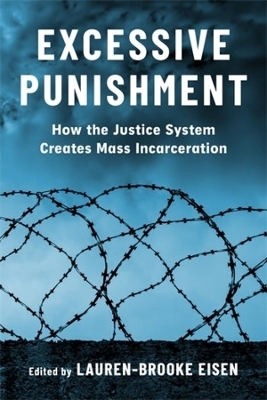
Excessive Punishment
Columbia University Press (Verlag)
978-0-231-21217-5 (ISBN)
The United States has by far the world’s largest population of incarcerated people. More than a million Americans are imprisoned; hundreds of thousands more are held in jails. This vast system has doled out punishment—particularly to people from marginalized groups—on an unfathomable scale. At the same time, it has manifestly failed to secure public safety, instead perpetuating inequalities and recidivism. Why does the United States see punishment as the main response to social harm, and what are the alternatives?
This book brings together essays by scholars, practitioners, activists, and writers, including incarcerated and formerly incarcerated people, to explore the harms of this punitive approach. The chapters address a range of issues, from policing to prosecution, and from how people are treated in prison to the consequences of a criminal conviction. Together, they consider a common theme: We cannot reduce our dependence on mass incarceration until we confront our impulse to punish in ways that are excessive, often wildly disproportionate to the harm caused. Essays trace how a maze of local, state, and federal agencies have contributed to mass incarceration and deterred attempts at reform. They shed light on how the excesses of America’s criminal legal system are entwined with poverty, racism, and the legacy of slavery. A wide-ranging and powerful look at the failures of the status quo, Excessive Punishment also considers how to reimagine the justice system to support restoration instead of retribution.
Lauren-Brooke Eisen is senior director of the Brennan Center’s Justice Program. She is the author of Inside Private Prisons: An American Dilemma in the Age of Mass Incarceration (Columbia, 2017) and has written dozens of reports and articles on how to reduce the United States’ reliance on incarceration.
Introduction, by Lauren-Brooke Eisen
Part I. A History of Crime and Punitive Response
1. Addressing Violent Crime More Effectively, by David Alan Sklansky
2. Losing Our Punitive Civic Religion, by Jonathan Simon
3. Mass Incarceration and Victim Disregard: Two Sides of the Same Coin, by Lenore Anderson
4. Crime, the Idea, by Emile DeWeaver
Part II. Federal Funding Drives Punitive Justice
5. The Federal Funding That Drives Mass Incarceration, by Lauren-Brooke Eisen
6. The Role of Federal Funding in Improving American Justice, by Ed Chung
Part III. Prosecution and Sentencing
7. The Prosecutor Problem, by Paul Butler
8. The Trial Penalty: Coercive Plea Bargaining, by Martin Sabelli
9. End Mandatory Minimums, by Alison Siegler
10. The American “Punisher’s Brain,” by Andrew Cohen
11. Punishment Over Prevention: U.S. Drug Policy, by Morgan Godvin
12. Improving Sentencing Policies to Improve Trust and Legitimacy, by Adam Gelb
Part IV. Racism and Punitive Excess
13. How Punitive Excess Is a Manifestation of Racism in America, by Theodore R. Johnson
14. We Must End the Carcerality in Our Own Hearts, by Monica Bell
15. Race, Mass Incarceration, and the Disastrous War on Drugs, by Nkechi Taifa
Part V. Uncovering Life Behind Prison Walls
16. How Atrocious Prison Conditions Make Us All Less Safe, by Shon Hopwood
17. What Did You Call Me?, by Rahsaan “New York” Thomas
18. The Inhumanity of Solitary Confinement, by Christopher Blackwell
19. A Culture of Abuse in Our Nation’s Prisons and Jails, by Kathy Foer-Morse
20. Surviving a Daily Storm, by Asia Johnson
21. COVID-19 and the Struggle for Health Behind Bars, by Homer Venters
22. Independent Oversight Is Essential for a Safe and Healthy Prison System, by Michele Deitch
Part VI. Prison Reform in the United States
23. How Some European Prisons Are Based on Dignity Rather Than Dehumanization, by Ram Subramanian
24. Embracing Dignity: Pennsylvania’s Experiment with Scandinavian Correctional Principles, by Steven L. Chanenson, Jordan M. Hyatt, and Synøve N. Andersen
Part VII. Punishment of Young People
25. Treating All Kids as Kids, by Kim Taylor-Thompson
26. Treat Kids Like Kids: The United States Is One of the Only Countries That Gives Life Sentences to Juveniles, by Michael Mendoza
Part VIII. Economic Injustice and Collateral Consequences
27. Monetary Sanctions as a Pound of Flesh, by Alexes Harris
28. Collateral Consequences and the Enduring Nature of Punishment, by Cameron Kimble and Ames Grawert
29. Probation and Parole as Punishment, by Peggy McGarry
30. A Holistic Approach to Legal Advocacy, by Blake Strode
31. The Dehumanizing Work of Immigration Law, by Jennifer M. Chacón
32. Exploring Immigration Collateral Consequences Related to a Criminal Conviction, by Khalil Cumberbatch
Part IX. Beyond Bars: Another World Is Possible
33. Providing Hope and Freedom to Overpunished People: Where Both Seem Impossible to Achieve, by David Singleton
34. Countering Excessive Punishment with Chances for Redemption, by Carlton Miller
35. Educating for Justice in the Era of Mass Incarceration, by Karol Mason and Erica Bond
36. Redeeming Punishment in America, by Heather Rice-Minus
37. Criminal Justice Has Been and Must Remain Bipartisan to See Success, by Jason Pye
38. No One Answer to Overpolicing and Mass Incarceration But Many, by Alia Nahra and Hernandez Stroud
Conclusion: The Era of Punitive Excess, by Jeremy Travis and Bruce Western
Acknowledgments
List of Contributors
Index
| Erscheinungsdatum | 13.03.2024 |
|---|---|
| Verlagsort | New York |
| Sprache | englisch |
| Maße | 152 x 229 mm |
| Themenwelt | Sachbuch/Ratgeber ► Gesundheit / Leben / Psychologie |
| Recht / Steuern ► Strafrecht ► Kriminologie | |
| Sozialwissenschaften ► Politik / Verwaltung | |
| ISBN-10 | 0-231-21217-8 / 0231212178 |
| ISBN-13 | 978-0-231-21217-5 / 9780231212175 |
| Zustand | Neuware |
| Haben Sie eine Frage zum Produkt? |
aus dem Bereich


